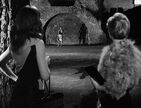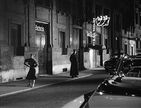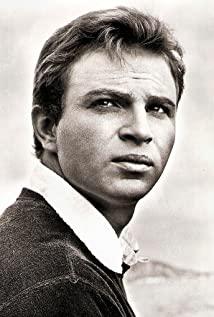According to the theory of "dramatization" in sociology, social life is regarded as a dramatic presentation and interaction, consisting of different roles, troupes (plural roles), and their corresponding symbolic rituals and interaction modes. drama. Since "life is like a play", there will always be tragedy. So, what kind of role would be suitable to play tragedy?
Maybe "Joker"? We're all familiar with the story of the most hilarious clown who developed depression himself. This seems to support the truth that comedy is always built on the tragedy of others. However, from Camus' point of view, the "clowns" who are in a tragic state sometimes live undisturbed but more at ease; naturally, being aware of the tragic nature of their lives is itself a tragedy. So, what should we do when we find out that "the clown is me" when life is in tragedy?
Obviously, in the eyes of the audience, the protagonist of the film Kabylia is the "clown" in the tragedy of his life. This article chooses Kabylia's characters as an example to analyze the tragic source of Kabylia's life, and see how she answers the questions raised above with practical actions.
At the beginning of the film, a couple frolicking in front of the camera are Kabylia and her boyfriend she has only known for a month. Kabylia rushed to the river bank, like a little girl who had just heard the bell for the end of get out of class, her purse flying in the air witnessing her joy. However, in this movie, which was labeled as a "love movie", the sweet and comfortable scenes of love did not occupy much time. Just as Kabylia was humming a tune by the river, the man beside her pushed her into the river. Maybe he was still making a promise to Kabylia a few minutes ago, but now this man has already fled with her wallet. In less than a minute, the director let us witness the illusory nature of a love and the tragic experience of Kabylia.
We don't know if this is the first time she's experienced something like this, but it certainly won't be the last.
Kabylia is naive and simple. When she was rescued by a group of people, her first reaction was to call the name of the man who had just pushed her into the water. However, she is not in a hurry to find a man for revenge, but wonders why her "boyfriend" is not by her side. Ignoring the strange eyes of the lifeguards, Kabylia picked up a pair of small shoes and ran home, knocking on the unanswered door. When her best friend asked her what happened, she said lightly, "We went for a walk by the river, and then... I fell into the water. He was scared and ran away by himself." Strange, did she get water in her head? Does she really not know how she fell into the water? Maybe it's just that she doesn't want to face this reality? Innocent and simple people will not make too many malicious speculations about the people around her - probably because she is subconsciously unwilling to believe that the man she loves will abandon her for 40,000 liras (PS: "For a bowl of Luo Song Tang can spark a revolution", "Battleship Potemkin"). Even though her friends kept making fun of her, she was reluctant to accept it. Constantly thinking about why that man abandoned her, she felt that her true heart should be rewarded, no matter what, she would not be put to death by him. In the end, Kabylia accepted the reality and said "I'm an idiot" like Mrs. Xianglin, always scolding men for not cherishing them, "Where can (you) find a woman like me?" All of the man's memories were buried in the fire, and he returned to the hut cursing.
Kabylia is honest. She has the emotional characteristics of a typical Italian. When angry, Kabylia widened her eyes, waved her arms like Hitler, showing an air that did not match her height, and fought with people who made fun of her; when she was happy, she would accompany her. She dances to the music, like a little girl who has not yet experienced the world; when she is sad and sad, she will lament her ill fate, and her big eyes are filled with helplessness and pity. (PS: The actress who plays Kabylia is the wife of the director of the film, Fellini. The director can actually "allow" his wife to play this kind of clown sex role)
Of course, Kabylia is not always "unlucky", and the gleam of fate briefly shines on her windowsill ("Burning"). Once, she witnessed a quarrel between a couple, and then the abandoned man got into the luxury car alone and greeted Kabylia, who was also lonely, to get in the car. At first, Kabylia was puzzled and impatient with the man's inexplicable behavior. But when he learned that the man around him was a popular star that no one knew about, Kabylia was full of joy again, and even showed off to unfamiliar passers-by. However, perhaps it was only the big star who was abandoned by his girlfriend in order to relieve loneliness that Kabylia was "fortunate" to experience this affair. It's a pity that our poor Kabylia was forced to spend her nights in the bathroom when the big star's girlfriend, Pear Blossom, snuggled up beside her lover in the rain. Of course, if there's anything Kabylia has gained from the experience, it's probably a few bills from big stars and new fodder for her friends to laugh at her.
Kabylia is stronger, but it also reflects the sensitive inferiority complex in her heart. Forced to make a living, Kabylia became a prostitute at a young age, full of human warmth. Even so, she always likes to flaunt her "different". In the movie, Kabylia said something like "I'm not like them, I have my own house" at least three or four times - even in the face of wealthy superstars, she is so "outrageous". Naturally, happiness comes from struggle, and even more so from comparison. On the streets of Rome, where every inch of land is expensive and there are many people living in the street, houses are naturally enough capital to "distinguish". Kabylia found a sense of superiority enough to fill her inferiority complex. Therefore, it is not difficult for us to understand that she would be so mad at those who tried to expose her shortcomings.
Fate is unfair to people like her, but she didn't want to make some changes in the past. Like some equally disaffected by the status quo, Kabylia once hoped to appeal to the power of religious mysticism. In front of the statue of the Virgin, Kabylia said with her big tearful eyes, "Maria, save me, help me change my life, let me change my life." But does God really favor her for this? After the religious ceremony, everyone was lounging on the lawn, except for Kabylia, who was sullen, she said in an angry and disappointed tone, "Our life has not changed at all! No one! We are still the same as before. ." Kabylia, who yearned for freedom in her heart but couldn't really escape, rushed to the clergy of the pathway with the strength of wine, venting her dissatisfaction that religious belief could not "save" herself. Kabylia showed her teeth and claws and made a fool of herself, but in the end she could only sit on the grass and shed useless tears.
But after so much, Kabylia is still like a little girl from the bottom of her heart, and she still longs for her own love. What religious mysticism can't do, maybe the power of love will save her? After being hypnotized by a magician in the theater, Kabylia reveals her innocence and sincerity. But when she found out that it was just a dream, and the innocence in her heart was visible to everyone, Kabylia was angry and ashamed. She was afraid of being made fun of again, and she waited until the dead of night to leave the theater.
At the door of the theater, she met a man named Oscar. Oscar told Kabylia that he was very moved by the "performance" at the theater just now. He believed that he was a confidant whom Kabylia had never met before. The innocence and innocence of Kabylia, which once brought her tragedy, became a rare treasure in Oscar's mouth. "We can all pretend to be cynical or scheming, but when we're faced with something pure and innocent, the mask of hypocrisy comes off and something good comes to mind," Oscar said. Having experienced so many Kabylia, naturally hesitant to respond to the sudden "fate". But with the unremitting efforts of the man, the two gradually began to communicate. The man in front of him is elegant and polite, has a serious job, is articulate, takes the initiative and abides by his sense of proportion, "he is even quite handsome", and does not dislike Kabylia's experience. In this way, Kabylia's heart defense was once again disintegrated.
After Oscar proposed to her, Kabylia danced with her hands, her joy was beyond words, her short legs also ran fast, and she told her companions her plans for the future - completely without the restraint and restraint in front of the man when she was proposed. hesitate. For a moment, we all expected Kabylia to end the cycle of fate. However, please note that Kabylia is in dialogue with her companions through a barbed wire - the director uses symbolism to imply that Kabylia is still a bird in a cage that longs for freedom but is restricted, so that Audiences can foresee the beginning of a new round of tragedy (see "The Four Hundred Blows"). But at this moment, in Kabylia's heart there is only hope and joy for the new life. She sold the house she regarded as a treasure and planned to fly away with the man she loved. Before leaving, she did not forget to tell her good friend, "You will also encounter miracles in the future, just like me". But is all this really a product of the Virgin Mary's care for her?
Naturally, the plot didn't move toward another possibility. At the end of the movie, Kabylia and Oscar take a walk to the river we are familiar with. The familiar story unfolded again. When Kabylia jokingly mentioned her experience by the river, she noticed her fiancé's expression was strange... But the 400,000 lire she had earned from the sale of the house was brutally snatched away by the man, leaving only the grief-stricken man on the grass. Kabylia. The only difference is that this time Kabylia was not pushed into the river.
Kabylia, who has just been heartbroken by the man she loves, Kabylia who has fallen down twice in the same place, and Kabylia who has experienced so many great joys and sorrows. She slowly stood up from the grass, took away the flowers on the grass, and walked out of the forest alone, with a helpless expression on her face, and the laughter and laughter of everyone on the roadside seemed to have nothing to do with her. But at this moment, the happy atmosphere on the street infected her heart, and a smile appeared on Kabylia's face, which was full of tears. Who knows what will happen to her in the future? We don't know.
Going back to our initial question, how to deal with the phenomenon of "the clown is me"? Resistance may be a way out.
In "Joker" starring Phoenix, he was also dissatisfied with his current status as "Joker" and took the act of rebellion against the ideal society. But this act of defiance is anti-social, and in real life, very few people take it.
We find in Kabylia's image that innocence constitutes the source of the tragic character of the characters - a cruel society is always unfortunate for the innocent. Therefore, when the director expressed his admiration for innocence and purity through the mouth of that hypocritical man, it could not help but be said to be a complete irony. Kabylia is like a Sisyphus character, constantly pursuing and failing, wanting to change but helpless. But Kabylia is also resisting, but her resistance is "negative". She did not give up her hope for beauty because of the difficulties, nor did she lose her true self because of the cold and warm society, nor was she shaped by society into someone she did not want to be. She may be "stupid", but she has lived a real life, and she is always more handsome than those who are hypocritical. Therefore, in my opinion, this is a "healing movie in disguise", that is, crushing the heart and mending it.
In society, the "larger masses" tend to be silent. In fact, many people have had similar helpless and confused tragic experiences as Kabylia. From this point of view, we don't need to laugh at Kabylia, because many people have more or less her shadow.
View more about Nights of Cabiria reviews











